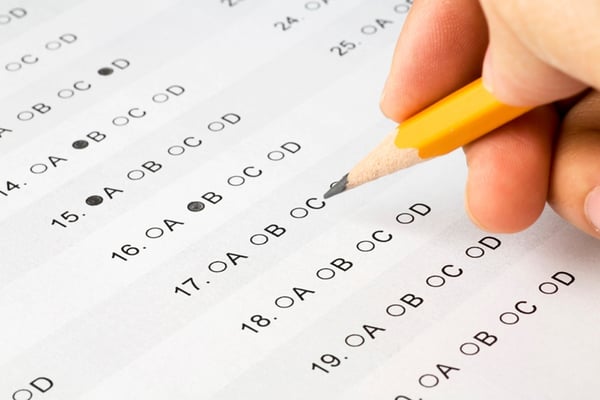
Scores from the June 6th SAT have been released, and they have served to increase the controversy around the test.
Put simply, the scores may be much less accurate than usual tests because the College Board was forced to throw out two of the sections.
Read on to see how students have reacted, how the scores vary from other administrations of the exam, and what your options now are.
The Confusion and the College Board’s response
There was quite a lot of confusion around how, exactly, the tests were going to be scored. Students were told many different and contradictory things when they phoned up the College Board – including that only section 8 or section 9 would be dropped, that they would both be dropped, that the experimental section would be counted instead, and that the two sections would only be dropped if the individual student had been affected – implying to some that if their proctor had stuck to the normal timings, that their scores would not be affected.
The College Board’s official statements, as well, furthered the confusion, at first implying that only one section would be eliminated, but they then updated it to state that two would be removed.
On June 25th, when the scores were released, the College Board issued the following statement:
Today, we are reporting scores for all students who took the SAT in the U.S. on June 6. As we previously communicated with students, due to a printing error in the standard test books provided by Educational Testing Service, the College Board and ETS did not score the two affected sections and are able to provide students with valid and reliable scores.
To make this determination, we conducted a comprehensive review and statistical analysis with three important components:
- First, the scores for the shorter test were shown to be sufficiently reliable — meaning they show technical consistency over repeated testings.
- Second, the equating process was not affected by the error. Equating is a statistical procedure that is conducted to ensure that different versions of a test are of comparable difficulty.
- Finally, the scored sections had the same distribution of content and skills as the full-length test and therefore is reflective of the overall SAT content specifications.
We have consistently communicated with College Board higher education members since learning of the misprint in the June 6 SAT administration book. Admission directors from across the country have told us they have full confidence in those scores and will view them just like scores from any other SAT administration. They want students to be assured of the integrity of their scores.
We take our responsibility to students very seriously, and we appreciate their patience as we’ve worked to deliver to institutions scores that are valid and reliable.
See the full text here.
What Have We Learned
The Scoring System Has Been Confirmed
It’s official: two sections (Section 8 and Section 9) were dropped from the test, and the experimental section was not subbed in for one of them. On your score reports, you will see that your raw scores are much lower than they normally would be because of this.
Universities WILL Accept the June 6th Results
It was very good of the College Board to call around and make sure that universities across the country will not be punishing students for their mistake.
It would have been even better of them to let us know this earlier, since it seems that they have had the information for a while, and it could have saved a lot of students from a lot of stress.
The SAT Is Too Long on Purpose
According to the same Q&A, the SAT that can be accurately graded from two fewer sections is intentionally built to be too long, just in case the College Board screws up and they have to drop several sections of the test.
So, according to them, they have been planning for this kind of eventuality all along, even though it has never happened before.
And I’m sure that all of us who have been taking the needlessly long tests are terribly grateful for their due diligence.

The Equating Process Was Not Affected
In one of their more believable claims, the College Board has confirmed that the equating process for this exam was not affected. Equating is what the College Board calls their attempts to make sure that each SAT can be accurately compared to other SATs. Though the difficulty of each test is slightly different, they have certain “anchor” sections that they use to compare one to the other.
Fortunately, these sections were not the ones that were thrown out, so the College Board has been able to determine the difficulty of the test for the curve.
The College Board Is Still Not Showing Proof of Its Claims
The College Board made the interesting decision of posting a Q&A interview with Jack Buckley, Senior Vice President of Research, in which he is specifically asked how they determined the validity of the shortened test and he proceeds to….not answer the question.
Instead, Buckley tells that the criteria for determining the validity of the test were:
- whether scores could be "reliable" without two sections
- if the tests could be equated
- if the remaining sections had the same skill content and distribution
He does not, however, go on to explain how these tests were actually carried out.
One of the main requests from students and parents across the country has been that the College Board show proof that the tests are as “reliable” as they claim they are. There have been a few suggestions for how to do this, including
- Releasing Sections 8 and 9 so that students can see how they would have done with those sections added in, compared to how they did without them.
- Showing an anonymous test from a previous year, scored at both the full length and with two sections missing.
After all, if the test is so bulletproof, and if the College Board is so certain that the two missing sections are not going to significantly affect scores, then why won’t they show us the proof?
What Problems We Still Have

“Sufficiently reliable” and “valid” do not mean the same thing as “accurate”
This is more like an ACT question than an SAT one, so maybe they're hoping that students won’t notice that there is quite a difference in meaning between "reliable," "valid," and "accurate."
The College Board has now issued several statements saying that the test has been proven to be sufficiently reliable. However, it now seems that their criteria for this is almost entirely based on the structure of the test, as opposed to the scores.
By “reliable” they mean that the two remaining math and critical reading sections had questions on similar concepts and of similar difficulty levels as the sections that were thrown out.
If this were only a knowledge-based test, this might be more significant. Unfortunately, the SAT is notorious for testing simple concepts in ways that are difficult to understand. So, it’s not altogether reassuring that the subject matter on the thrown out sections was not too different. A student could easily, for example, know exactly how to attack one question about absolute value, but be unsure about a second question on the same concept, just because of how it is worded.
“Valid” doesn’t really mean anything at all
Similarly, saying the scores are valid simply means that the College Board is happy to stand behind them. Considering that this is the most cost-effective option for them, it’s hardly surprising that they are willing (and glad) to do so.
Why aren’t the scores accurate?
The College Board has run statistical analyses of the scores on this test and compared it to other tests. They are calling the scores valid because there is a similar distribution of scores.
However, statistics always works best on a large scale, and that doesn’t mean that they can say how accurate their scores are on a case-by-case basis.
For example, if you were to flip a coin 1,000 times, you could be pretty certain that you would get heads about 50% of the time and tails about 50% of the time. But it would be really difficult to predict the outcome of just a single toss.
Similarly, though the overall scores fall into an appropriate SAT pattern, it’s impossible for the SAT to guarantee that individual students have not been affected by the dropped sections. Some students will have received lower scores than they otherwise would have, and others will receive higher scores.
Students who are mid-range scorers are least likely to be affected by the missing sections. The curves on the SAT are always more generous for mid-range scores, and if you're the type of student who could have expected to miss 15-20% of the questions on each section, then your scores are fairly predictable.
High scoring students are most likely to be affected. The curves are always harshest at the top, and on this test it is even more noticeable. If you missed just one question in math or critical reading, for example, your score will be lower than it would have been on almost any other SAT. For more on this, see the scoring charts below.
How Have Students Been responding?
Understandably, students and parents across the country have been none too pleased with the College Board and their results. Here are a few reactions from College Confidential:

I have just received my scores this morning and I am outraged. I have performed the worst I have ever done. I know for a fact this is due to the College Board's mistake because I have scored completely out of my score range for each section. I vividly remember feeling the most confident about the last two sections for critical reading and math, so I knew that those 2 sections would boost my grade, or at least balance out some mistakes I made on the previous two sections. So, of course it makes sense that my scores would suffer due to the removal of these sections and it is so frustrating knowing that I could have been done with the standardized testing process had the College Board properly administered the June SAT. Now I have to take the test in October, which will delay my early action application process. College Board, I am extremely disappointed in your lack of professionalism.
My son's scores were significantly lower. This was his 3rd time to take it. The first two times he scored 750 in CR (both times). This time… 680. His Math score was 10 points lower than what he scored in March however he had been working with a math tutor and had improved his math score on his last three practice tests (official CB practice tests) to numbers that should have been 30-40 points higher. This is just so frustrating. Without letting students and parents see what the scores would have been with the 2 omitted sections, there is no way to prove that these scores are "reliable" as the CB keeps touting. I know there are people who are going to say "you can't prove that your son didn't just happen to do significantly worse this time" but frankly to get 750 twice in a row on a section that w as only scored with 2 instead of 3 sets of scores is proof to me that these scores are not accurate. I want ACCURATE scores, not "reliable".
My sons went down, after having progressive improvement with previous two tests by 100+ pts ea time.... And he'd taken a month long prep course prior to this test. Math, down 70pts. Critical Reading down 60 pts. Writing down 30. Thanks SAT for wasting our time- was to be his final SAT prior to applying Aug 1st to college.
We were disappointed, but knew we would be. On every SAT (practice and actual -- yes, we got the booklet and answers from college board to confirm it) my kid had trouble with the first 2 sections. It takes her that long to settle in. This test was no different. Her math and reading scores went down over 100 points each and (the unaffected) writing stayed exactly the same as it had on the last 2 tests. We are definitely out of the norm for the stats. This test may be statistically similar for the general population, but certainly not equivalent for our situation.
Others are writing to the College Board directly, demanding an earlier retest:
October is too late to retest for those interested in early decision deadlines of November 2015. You should provide a new test date much earlier. Please consider the amount of extra time students study for the SAT in addition to regular school classes and extracurricular activities including community service activities. Again you should provide an optional testing day well before October 2015 specifically for those affected by your clerical mistake of June 6, 2015. I am sure your mistakes were not intentional but you did make a mistake. With this in mind the best course of action will be to benefit those affected by taking action above and beyond what you are proposing. Please schedule a new test before October 2015 because this date is not conducive to those who were affected by your mistakes of June 6, 2015 and create additional expenses, stress and anxieties for those who were affected by your mistakes.
...The College Board should set a good example for these students and provide an exam in late July so that the students can have their scores before they spend countless hours preparing college applications, researching schools, etc. October 3 is far too late for many students who intend to have their applications completed prior to that date. Many schools have strict deadlines when it comes to providing merit scholarships, and by not retaking the exam until October 3 thousands and thousands of students will not know truly where they stand in relation to acceptance and scholarships. Not to mention that any of the study skills, etc. that the students used for the June exam will be ancient history by October. This means many more study hours for the students plus the potential for a lot of money to be paid to tutors as there will be a lot of stress for this final opportunity to take the exam for the class of 2016. SHAME ON YOU COLLEGE BOARD!!! DO THE RIGHT THING AND PROVIDE AN EXAM WITHIN THE NEXT FEW WEEKS. This is way too important to ignore or to hide behind the desire for more financial profit....
How Do Your Scores Measure up?
The best way to see how accurate your scores are is to compare them to the grading systems on previous administrations of the SAT.
The College Board has officially released several tests, along with the curves used to grade them.
Will this give me my “real” score?
No. As you can see, each test has a different grading scale. This is because of the “equating” system that the College Board uses, so that more difficult tests can be compared to easier ones. As you can see in the following images, one question wrong on different tests means different grades.
There are too many unknown factors to know what your “real” score would have been with the two sections added in. First of all, you don’t know how you did on those sections. While many people are claiming that they think they didn’t miss any, there’s obviously a very real chance that you did.
Also, we don’t know how the difficulty of the June 6th SAT measures up to the difficulty of the tests below. It could have been much more difficult, or much easier. Without knowing that, it’s impossible to tell what the actual grading scale would have looked like.
How should I use this information, then?
Use the information below to compare your results with what you would have gotten on other tests. This can give you an idea of how you might have done, but it's not exact.
For example, here are screen shots of my results.
In Reading Comprehension, I missed 4 questions. That would normally come out to a raw score of 62.
In looking at the below charts, I can see that a raw score of 62 is usually in the range of 740-760. Instead, I scored a 710.
This is quite a bit lower than what I “should have” scored.
I, too, remember Section 8 being quite easy and I was confident in my answers. But everyone makes mistakes, and it’s impossible to say with certainty that I wouldn't have missed more questions.
If I had missed another 2 questions, which was my average wrong on the previous two reading sections, my raw score would have been a 60. On the tests below, you can see that would have been equivalent to a score of 720-730. This is still higher than what I got on the June 6th test, but only marginally so.
In math, I only missed one question. If I assume that I wouldn’t have missed any others (after all, I did have one error free section), then my raw score would have been 53. As you can see below, 760 is a fair bit harsher than you normally see on math for missing one question, which would have given a score of 790-800 on the below tests.
What is the score range?
It’s also important to keep in mind that the College Board always recommends thinking of your score as a range instead of a number. This is what your “score range” is all about.
The College Board has always given a score range because they know that one test cannot perfectly measure your abilities. They know there are a lot of factors on test day, like being overly tired, that may affect your score, or that anxiety may make you get stumped on a certain question that normally you would get with no problem at all.
Your score range is usually around 30 points below your score, to around 30 points above your score. The idea is that if you were to take the SAT with no additional prep, you should expect your score to be in that range.
So, if the differences that you're noticing between your actual score and either your previous scores or the range of scores you can see below is greater than 30 points, there’s more cause for you to be concerned about the accuracy of your scores.
On the flip side, if your score was 20 points lower than the last time you took the test, and you didn’t do a significant amount of extra prep, you should know that those scores are probably pretty accurate.
Here are the scoring guides – how do you compare?
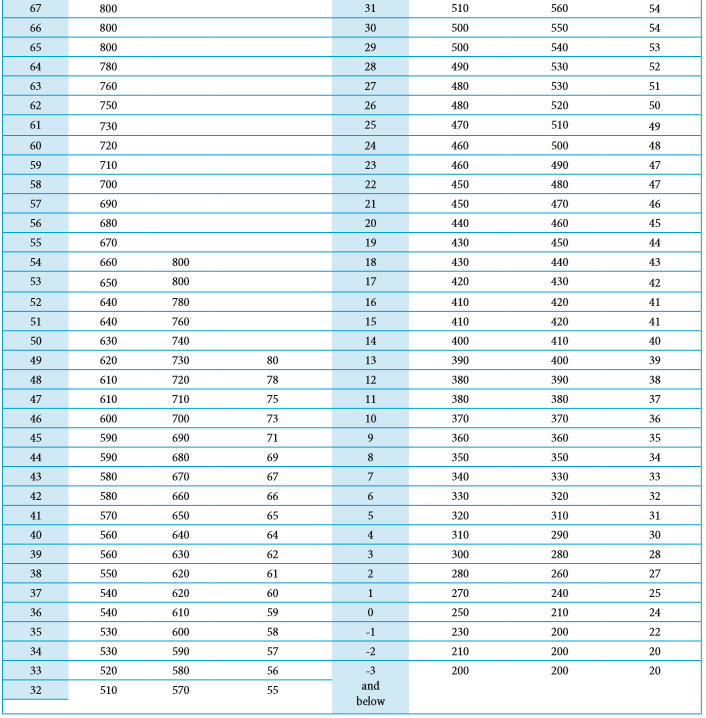
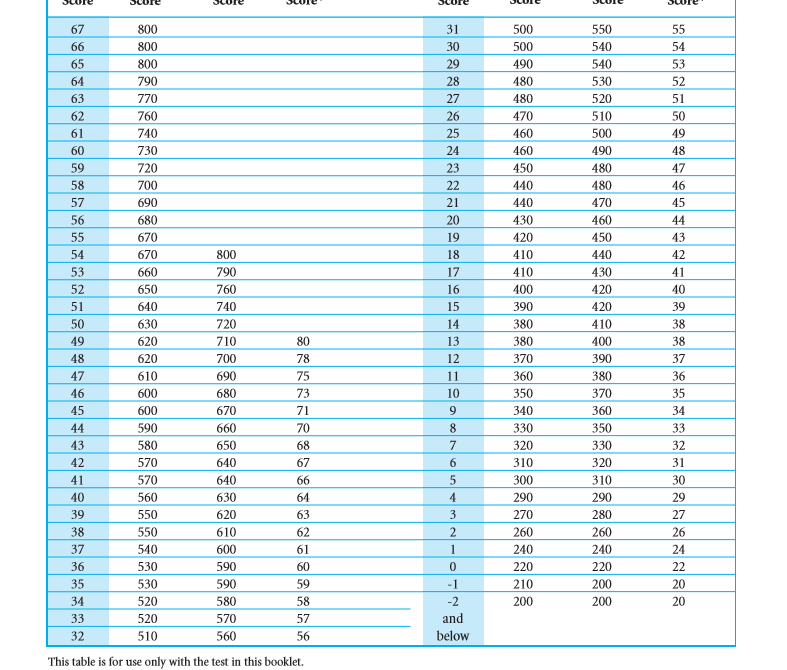
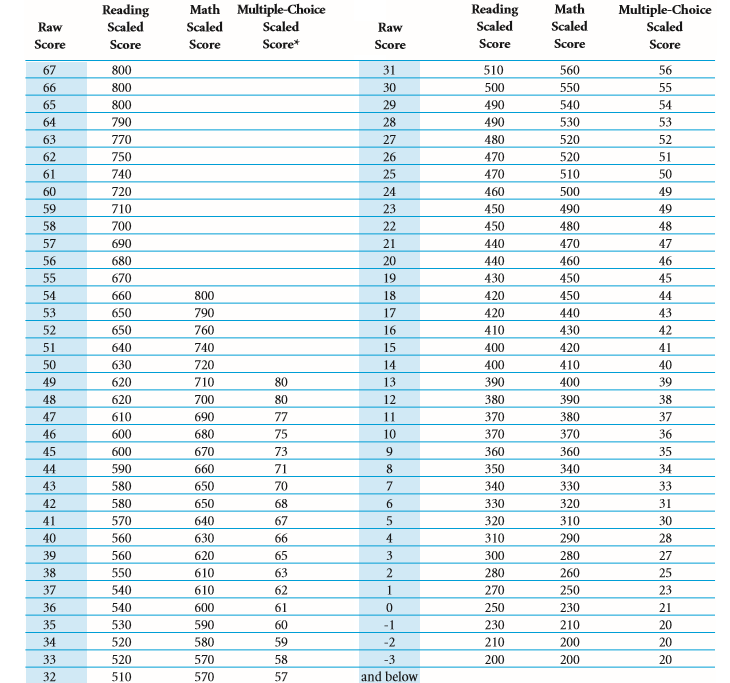
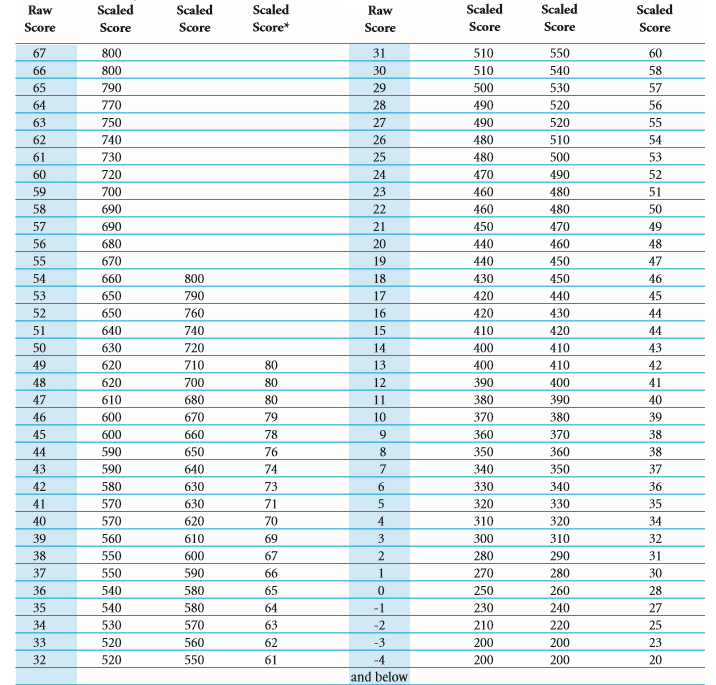
Where Do You Go From Here?
Unfortunately, the College Board is still unwilling to give students a summer makeup test. You can, however, register for free for the October test if you're not satisfied with your scores.
If you would like to re-take the test, start studying now. You're at a great advantage because you have all summer, without the stress of schoolwork, to master the tricky concepts.
Check out our guides for improving low scores or getting a perfect score for October, and if you remember any concepts you thought were particularly difficult, review them in our free online guides.
Keep in mind that colleges understand the score range¸ and that they are also happy to accept the June 6th scores. If for some reason you cannot or do not want to make up the test, try not to stress out if your scores were only marginally worse than the last time you took the SAT.
All students should keep an eye on the FAQ on the College Board web site for the June 6th test in case there are updates.
Also, if you have questions or complaints and want a response from the College Board, call their customer service line at 866-756-7346. They're asking people to email them customer service problems, but this is because it makes it easier for them to issue stock responses.
Finally, if you feel cheated by the College Board’s mistake, don’t forget about the pending lawsuit against them. If the College Board loses, you may be due some compensation.
How did you do? How do your scores compare to what you would have gotten on a previous test?
Tell us below in the comments or tweet us @prepscholar.
Disappointed with your scores? Want to improve your SAT score by 160 points? We've written a guide about the top 5 strategies you must be using to have a shot at improving your score. Download it for free now:
Have friends who also need help with test prep? Share this article!

Mary Ann holds a BA in Classics and Russian from the University of Notre Dame, and an MA from University College London. She has years of tutoring experience and is also passionate about travel and learning languages.

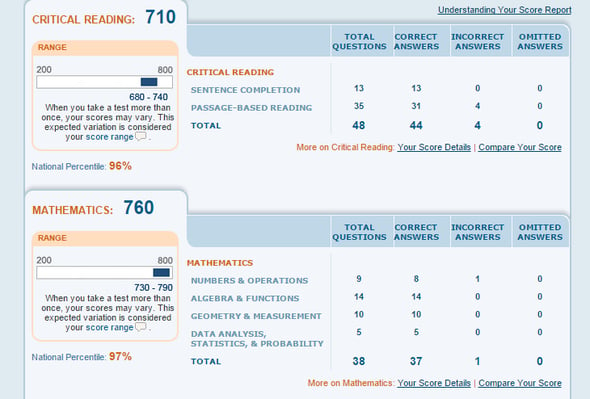

































 Holly R.
Holly R.